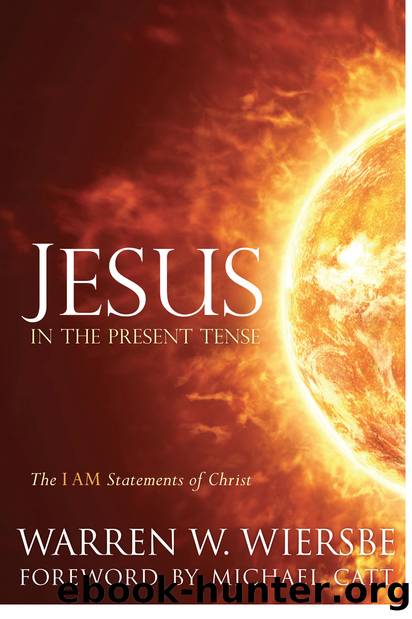Jesus In the Present Tense by Warren W. Wiersbe

Author:Warren W. Wiersbe
Language: eng
Format: epub
Publisher: David C Cook
Published: 2011-06-16T00:00:00+00:00
8
The Way, the Truth, and the Life
I am the way and the truth and the life. No one comes to the Father except through me.
âJohn 14:6
I have chosen the way of faithfulness; I have set my heart on your laws.
âPsalm 119:30
There is a way that appears to be right, but in the end it leads to death.
âProverbs 14:12
But when he, the Spirit of truth, comes, he will guide you into all the truth.
âJohn 16:13
The Spirit gives life; the flesh counts for nothing. The words I have spoken to youâthey are full of the Spirit and life.
âJohn 6:63
Salvation is found in no one else, for there is no other name given under heaven by which we must be saved.
âActs 4:12
For there is one God and one mediator between God and human beings, Christ Jesus, himself human, who gave himself as a ransom for all people.
â1 Timothy 2:5â6
This day ⦠I have set before you life and death, blessings and curses. Now choose life, so that you and your children may live and that you may love the LORD your God, listen to his voice, and hold fast to him. For the LORD is your life.
âDeuteronomy 30:19â20
The Bible records many farewell addresses. Moses gave the longest address (thirty-three chapters in Deuteronomy), and Paulâs is one of the shortest (Acts 20:13â35). But of all the farewells given anywhere, surely our Lordâs discourse in the upper room is the deepest (John 13â16). You may read and ponder it again and again and always learn something new.
Jesus gave this discourse to prepare His disciples for His departure, because it would be their privilege and responsibility to carry on His work after He returned to heaven. First, Jesus taught them (John 13â16); next, He prayed for them (John 17); and then, He went out and died for themâand for us. At Pentecost the Holy Spirit came to empower the believers (Acts 2), and Peterâs ministry that day brought three thousand people to faith in Christ.
Perhaps the most important word in the Upper Room Discourse is Father, which is used fifty-three times. (The word is found over one hundred times in Johnâs gospel.) Jesus said to His Father, âI have revealed you [your name, Greek text] to those whom you gave me out of the worldâ (John 17:6), and the name He was referring to was probably âFather.â In the Old Testament, you donât find God referred to as âFatherâ very often.1
Because Jesus is the way, the truth, and the life, He is able to minister to the hearts of people.
Troubled Hearts
The words troubled (John 14:1, 27) and grieved (16:6, 20â22) indicate that the atmosphere in the upper room was serious and sober. While the disciples didnât fully understand all that was transpiring that night, they knew enough to be concerned; and they were troubled for several reasons. To begin with, they were grieved because their Master was going to leave them and they didnât feel adequate for the work that lay ahead. Even more, Jesus had announced that a traitor sat at their table, and they wondered who he was.
Download
This site does not store any files on its server. We only index and link to content provided by other sites. Please contact the content providers to delete copyright contents if any and email us, we'll remove relevant links or contents immediately.
Thirst by Scott Harrison(571)
Life Word by Jon Gordon(454)
Render Unto Rome by Jason Berry(434)
A Fork in the Road: Choose Poverty or Prosperity by Ligard Vidar(367)
Produced by Faith: Enjoy Real Success without Losing Your True Self(365)
Hello, Tomorrow!: The Transformational Power of Vision by Cindy Trimm(351)
Grand New Party by Ross Douthat(347)
Roy Williams Plays: 3 by Roy Williams(344)
A Guide to Confident Living by Norman Vincent Peale(321)
Praying the Book of Job by Elmer L. Towns(294)
25 Ways to Win with People by John C. Maxwell(282)
How to Justify Torture by Alex Adams(281)
The Solomon Secret by Fleet Bruce(275)
Religious Ethics in the Market Economy by Karl G. Jechoutek(273)
The Fred Factor by Mark Sanborn(264)
The Generosity Factor by Ken Blanchard(252)
The Life-Giving Leader by Tyler Reagin & Craig Groeschel & Andy Stanley(244)
Bold Followership by Maurice A. Buford(242)
Say Yes to No Debt by DeForest B Soaries Jr(240)
